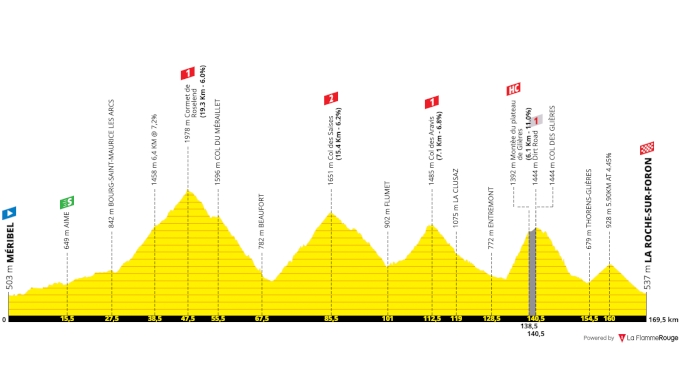The Seven Key Mountain Stages Of The 2020 Tour de France
The Seven Key Mountain Stages Of The 2020 Tour de France
The Tour de France in 2020 will be defined by seven key mountain stages. Read on to see what climbs the GC will be decided on.
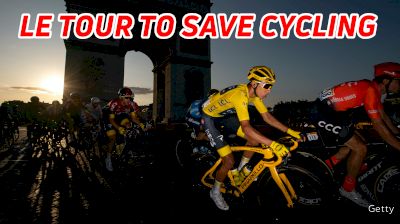
Stage 2
Early mountain stages in grand tours often appear exciting on paper, but conservative early strategies employed by GC contenders results in underwhelming drama at times. That said, historically the opening stages of the Tour de France are the furthest thing from underwhelming.
Join Pro to watch the 2020 Tour de France live and on-demand in Canada.
Both nerves and stakes are at a season high for riders in the opening week of the Tour. Combine that with the costs of losing half of the season to the Coronavirus pandemic, and the tenuous security of every rescheduled day of racing to come. Suffice it to say, complacent racing is not expected in 2020.
The 187-kilometer second stage of the Tour begins and ends in Nice and has two category 1 climbs in the first 100 kilometers. It is not the day where the Tour will be won, but it is a day where it could be lost.
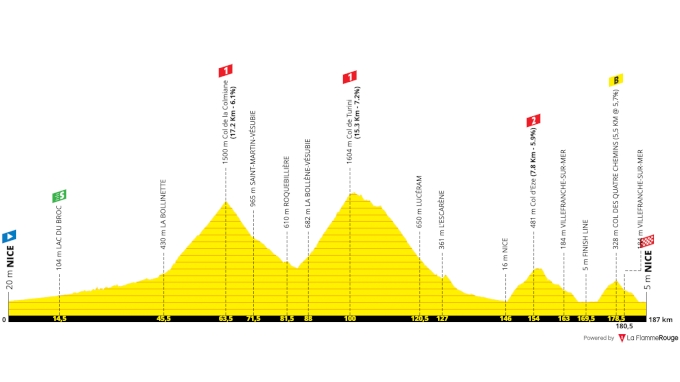 Stage 8
Stage 8
There has been a movement in modern cycling to rely on shorter, more explosive stages to keep grand tour racing interesting. The Tour de France embraced this ethos in 2020, and stage eight is the first example of the model. Stage eight is a brief 140 kilometers featuring an HC climb sandwiched between two category 1 ascents, the latter of which tops out a mere 11 kilometers before the finish line in Loudenvielle.
The short stage packed with punchy climbs and consequential descents brings a certain French rider to mind. If Julian Alaphilippe hasn't already made a bid for the yellow jersey, he will certainly be tempted on stage eight.
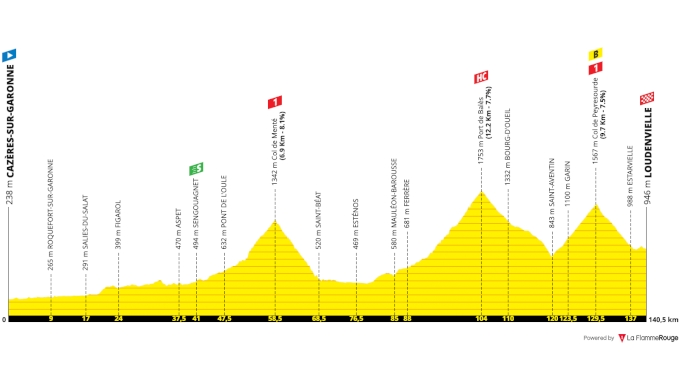 Stage 13
Stage 13
Across the entire 192 kilometers from Chatel-Guyon to Puy Mary-Pas de Peyrol the peloton will enjoy less than 15 kilometers of flat road. With seven short intense categorized climbs, the saw-toothed profile of stage 13 will pose a major challenge to any team hoping to control the race. The stage will pose an even greater challenge to the peloton, should a team fail to maintain control.
This sort of stage can play out two ways. It can be a great day for the breakaway, or it could break the race wide open, with huge time gaps at the line. Only time will tell who will be victorious on the Tour’s first summit finish of 2020.
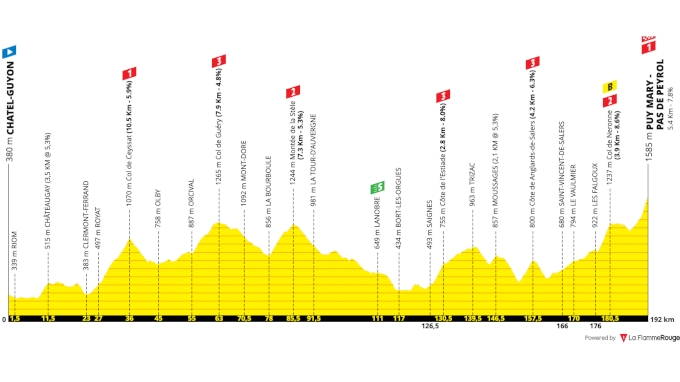 Stage 15
Stage 15
99 kilometers into the Tour’s 15th stage, things are going to get interesting. After a pan flat opening, the peloton will arrive at the base of the Jura mountain range. The final 75 kilometers of the stage contain three major climbs finishing with the monstrous 17.8-kilometer long Grand Colombier. It's seen as one of cycling's most difficult passes with plenty of 12% sections taking the race up to 1497 meters. There will be no hiding for the GC contenders on stage 15, and climbing legs will be at a premium.
Side note - Stages 14 and 15 take the peloton from the Massif Central to the Jura Mountains. The route east may be flat, but there is a very real threat of crosswinds along the exposed plains between the two mountain ranges. With that in mind, it will be worth tuning into the the first 99 kilometers of stage 15.
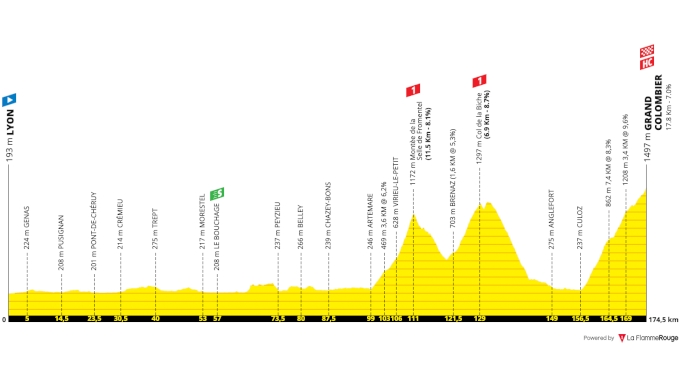 Stage 16
Stage 16
If the peloton has any legs left after the Grand Colombier, expect a feisty finish on stage 16. The brisk 164 kilometer stage features five categorized climbs and finishes on a 2.6 kilometer long ramp. The finishing kick may not lend itself to huge time gaps, but the category 1 ascent which tops out 20 kilometers prior, combined with tired legs could create some general classification intrigue in the finale.
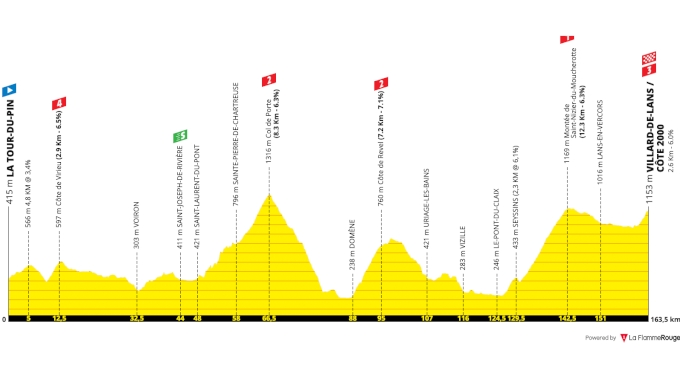
Stage 17
Take a seat and prepare for something truly special on stage 17. Two HC climbs lie in the final 90 kilometers of the stage. Col de la Madeleine, a 15.8-kilometer grind at 8.1% will give way to Col de la Loze, one of the highest passes in France, which is graced by what may be the world’s most beautiful bike path.
The path opened in May of 2019 and was broken in by the 2019 Tour de l’Avenir. The pristine tarmac and panoramic alpine views will make this climb an instant classic.
The scenery alone will keep you glued to your screen, if not planning your next cycling vacation, but do your best to pay attention to the race, because the 18.8-kilometer long, 7.6% summit finish will surely be consequential.
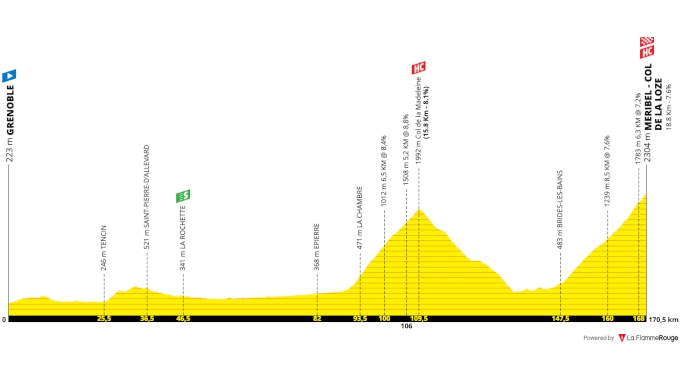
Stage 18
The final mountain test of the Tour, excluding the Planche des Belles Filles individual time trial, comes on stage 18. The 168-kilometer charge from Méribel to La Roche-sur-Foron will begin with an aggressive uphill start culminating with the category 1 summit of Cormet de Roselend, 47.5 kilometers into the stage.
In total, the peloton will tackle four major climbs, with an additional uncategorized 5.5-kilometer long speedbump and 10-kilometer descent to the finish.
The final categorized climb of the stage should be a stunner. The 6.1-kilometer HC ascent of Col de Glières finishes with an additional two kilometers of unpaved climbing to the summit.
For pure climbers such as Nairo Quintana, who may not want to let their overall success rest on their performance in the stage 20 time trial, this day will be the day to throw everything they have at the race.
